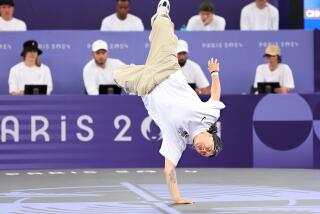Hers Was a Victory for Women
- Share via
On the surface, the idea was outrageous, the product of hucksters and hustlers who thought it would be cute to match a man and woman on the tennis court.
What happened was a change in perceptions, a dramatic declaration of independence that pulled apart the dark curtains of sport for a peek into an enlightened age of equality.
Sometimes, three sets of tennis can do magical things.
Twenty-five years ago today, Billie Jean King accepted the challenge of Bobby Riggs and cleaned the old guy’s clock with a 6-4, 6-3, 6-3 wipeout that was a bold statement for a whole generation of women.
It shouldn’t have been such a shock. King was 29, the best female tennis player of the time. Riggs was 55, long removed from his tennis prime, a hustler who talked a good game.
What’s remarkable is most people believed what he said. Maybe even King.
“I was very worried,” she said. “I was scared. I didn’t know what to expect. I knew his history. I knew he was one of the great players. I knew what he had done, the triple crown (singles, doubles, mixed doubles) at Wimbledon in 1939.”
The only other person to manage that feat was King in 1973. It seemed a natural promotion for Riggs, who knew about such things.
Riggs, who died in 1995, chased King for about three years, recognizing the appeal of an old guy, yapping at the opposite sex. King, though, had a more important agenda, organizing the Virginia Slims tour, trying to put together some regular program of tournaments for women, an outrageous idea in its own right.
“I kept telling him I had too much to do with the Slims Tour,” she said. “I didn’t have time to breathe.”
The tour was much more important to King. It always has been. “The tour was everything about growing the game,” she said. “I wanted tennis to be big. I’m still fighting that war.”
So Riggs went shopping elsewhere, luring Margaret Court into a match and beating her convincingly in something he called the Mother’s Day Massacre.
That put King on the spot.
“When Margaret lost, I had no choice,” she said.
She accepted the challenge and touched off a sports spectacle that wound up looking like a carnival sideshow.
Riggs, the hustler, embraced the event with enthusiasm. He swallowed vitamin pills by the handful to prepare. “He probably got toxic popping all those pills,” King said.
From her perspective, King knew that far more was involved than three sets of tennis.
“It was not about tennis,” she said. “It was about social change. It was about changing a way of thinking, about getting women athletes accepted.”
Understand the times. A quarter-century ago, sports belonged to men. Title IX, guaranteeing equal opportunity for female athletes in college, was barely a year old. The women’s movement was in its infancy.
And along came King, willing to push the envelope.
The promotion was straight out of Barnum & Bailey. The players were carried into the Houston Astrodome on pedestals, sort of like Caesar and Cleopatra, a surreal scene. The largest crowd in tennis history, 30,472, packed the Astrodome and 50 million more watched on television.
This was going to be big.
“I felt I was carrying the mantle of the women’s movement, absolutely,” King said.
She wasn’t the only one.
Donna Lopiano, executive director of the Women’s Sports Foundation, called the match the defining moment for the movement.
“Here was the first real men vs. women challenge on the court of gamesmanship, that would measure the psychological strength and confidence of women,” she said. “It challenged myths, society’s belief that women were not capable of competing with men, that they would not measure up under pressure, that they lacked mental toughness.
“The focus of all women was on her shoulders. She carried the flag. She was the only person for the job.”
King called the Riggs match “an agent for change.”
“It bolstered confidence and courage of women. Every day, somebody reminds me of that and how it affected them.”
Sometimes, though, King wonders whether today’s female athletes understand the full significance of the Riggs match.
“I don’t think they know,” she said. “Most people don’t care about history. They should, though. They’d know more about themselves if they did, about how they belong, how they fit into the fabric that has been woven.
“They can learn from the generations that came before them.”
More to Read
Go beyond the scoreboard
Get the latest on L.A.'s teams in the daily Sports Report newsletter.
You may occasionally receive promotional content from the Los Angeles Times.










